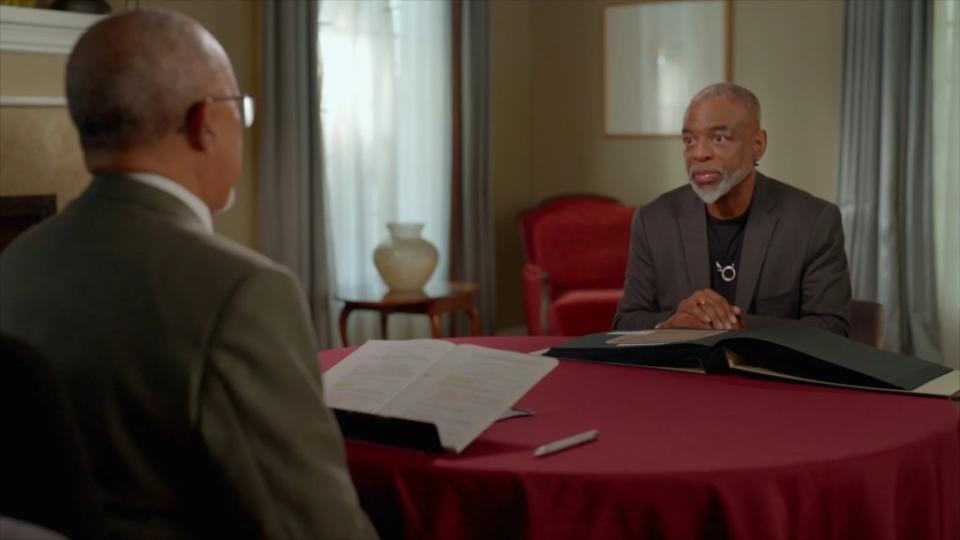How ‘Finding Your Roots’ Fights Racism ‘One Family Tree at a Time’
For 10 seasons and 106 episodes, Dr. Henry Louis Gates, Jr. has been helping people explore their family history on “Finding Your Roots With Henry Louis Gates, Jr.,” the PBS series that has delved into the often tangled family trees of almost 250 people. The program is the only PBS series to have experienced a growth in linear ratings over the last three years, it’s the network’s top-rated regularly scheduled program — and now, for Season 10, it is finally an Emmy nominee in the Outstanding Hosted Nonfiction Series or Special category.
“I am deeply humbled by the nomination, and I never dreamed we would get it,” said Gates, a Harvard professor of African American Studies who co-created the show and has hosted it for its entire run. He got the news in a hotel room in Las Vegas, where he’d gone to receive the Spingarn Medal, the NAACP’s highest honor for achievements by Black Americans. “I was in bed dealing with jet lag and thinking about my speech that night, and it was like my cell phone blew up.”
But he already knew that “Finding Your Roots” had been getting more and more attention over its decade-long run. “I was able to chart our growth in popularity because of people stopping me in airports or on the street,” he said. “And that has gone up dramatically, exponentially every year over the last 10 years. I’m particularly gratified about the fact that it is ideologically neutral: The people who stop me are Republicans and Democrats, people on the left, people on the right, older people, younger people.
“My favorite story is a big guy with a MAGA hat came up to me. I sort of jumped back and he said, ‘Professor Gates, I don’t like your politics, but I love your show. Can I have a selfie?’”

The program is an outgrowth of an earlier, two-season series called “African American Lives,” which uncovered the ancestors of Black stars like Oprah Winfrey and Whoopi Goldberg. After getting a letter from a woman of Russian Jewish ancestry who told him that he was “a big fat racist” for only focusing on Black subjects, he expanded his reach to include people of all races — and around the same time, he brought in CeCe Moore, a pioneer in the new science of genetic genealogy. Her work made it possible for the show to more deeply explore the genealogy of people for whom the paper trail has been erased, among them those of Ashkenazi Jewish ancestry.
“Through the use of autosomal DNA, she’s able to get around what genealogists called ‘the brick wall’ when the paper trail disappears,” he said. “And that’s been particularly satisfying for me.”
It also helps with what he says is a distressing lack of knowledge about our past. “One of the biggest surprises to me is that nobody in this country knows anything about their ancestors beyond two or three generations deep – great-grandparents, maybe. And I hope that introducing a person to their ancestors changes their relationship both to American history and to world history. It makes you a player in great historical events, and that’s very exciting.”
Season 10’s final episode went in a new direction by asking “regular people” to submit videos to the show. Out of the 9,000 entries, they chose three and the four staff genealogists gave those subjects the same in-depth treatment they’d give to celebrities. (“The ratings for that episode were the same as they were for celebrities,” he said.)
The season’s other subjects included Valerie Bertinelli and Brendan Fraser, Bob Odenkirk and Iliza Shlesinger, Danielle Brooks and Dionne Warwick and Wes Studi and LeVar Burton, the “Roots” star who had been on the show’s wishlist from the start. They join a decade of highlights that, for Gates, includes using DNA evidence to find that Larry David was cousins with the man he imitated on Saturday Night Live, Bernie Sanders, and identifying the grandparents of Andy Samberg and Téa Leoni, whose mothers were adopted and never knew their birth parents.
“This thing has grown and morphed in ways that I never dreamed when in 2003, I got up in the middle of the night to go t the bathroom and I just had this epiphany that I could do a documentary series for PBS,” said Gates, who added that the show now has “a very long queue” of more than 100 people who’ve agreed to be profiled in the series.
“It is a deeply moving, deeply rewarding experience,” he said. “And I’m just the messenger. I’ll go to my grave convinced that one of the reasons I was put on this earth is to help more and more people find the ancestors from whom they’ve descended. And when they can see their DNA admixture and realize how colorful it is, they go, ‘Where the hell did that come from?’” He laughed. “And I go, ‘Well, your ancestor was from Sicily and that was the big seaport, and weekend affairs… You just never know. The complexities of human passion and how it played itself out in your own genome. You have 500 years of ancestry floating around in your genome, which is quite a marvelous thing to contemplate.”
It’s also a thing that helps “Finding Your Roots” make a couple of points that are quite timely these days.
“What’s your favorite subject?” Gates said. “”Your favorite subject is yourself. This is a way of finding layers of meaning about your personal identity. But our two recurring subliminal political themes are, first, at the level of the genome, despite our apparent differences, we are 99.99% the same. And the second is that no matter how we look, no matter what your name is, we are all descended from immigrants. Even our Native American sisters and brothers, their ancestors migrated over the Bering Strait 15,000 years ago. We truly are a nation of immigrants, and that’s what makes us, in my opinion, the greatest country on the face of the Earth. Those are the lessons that we propagate every week, and I believe that’s the reason for our popularity.
“Our country is experiencing so much division and the rise of so many hatreds — antisemitism, anti-Black racism, xenophobia across the board, anti-immigrant feeling — and ‘Finding Your Roots’ fights racism of all sorts, one family tree at a time.”
A version of this story first appeared in the Down to the Wire: Comedy issue of TheWrap’s awards magazine. Read more from the issue here.
The post How ‘Finding Your Roots’ Fights Racism ‘One Family Tree at a Time’ appeared first on TheWrap.

